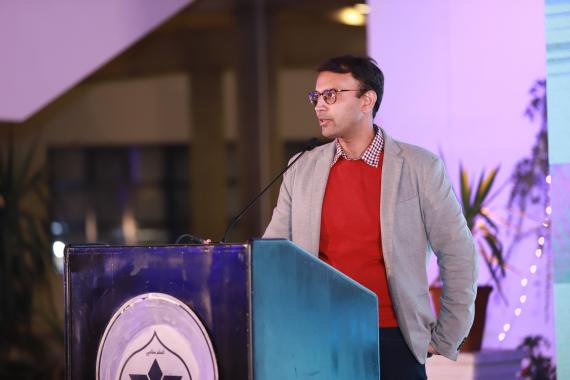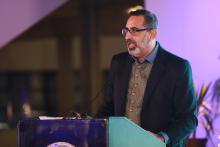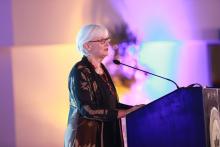
For over three decades, LUMS has stood out as Pakistan’s leading institution excelling in both teaching and learning. The University is committed to learning without borders and is driven by the belief that world-class education should be available to all – regardless of financial, geographical or social barriers. To further redefine the educational landscape of the nation and forward this vision, the University has established the LUMS Learning Institute (LLI).
The LLI was launched at a ceremony at the LUMS Central Courtyard on February 3, 2020. It was attended by Dr. Arshad Ahmad, Vice Chancellor LUMS; Mr. Shahid Hussain, Rector LUMS; Dr. Kamran Asdar Ali, Interim Provost LUMS; Dr. Suleman Shahid, Faculty Director LLI; Prof. Denise Chalmers, OLT Senior National Teaching Fellow, University of Western Australia; Dr. Tahir Andrabi, Dean Syed Ahsan Ali and Syed Maratib Ali School of Education (SOE); Dr. Launa Gauthier, Visiting Faculty SOE and Dr. Tayyaba Tamim, Associate Professor SOE. The LLI aims to enhance teaching and learning through evidence-based design and redefine educational spaces within the University and beyond. The centre will become an innovation hub for learning and teaching by providing training on a large scale, connecting students with teachers for establishing pedagogical partnerships directly and utilising modern technologies and innovative teaching tools – both offline and online.
The ceremony kicked-off with a note by Dr. Suleman Shahid, who gave an introductory presentation about the centre. He began his talk by drawing the audience’s attention to the location of the event and explained how the Central Courtyard at LUMS represents the University’s no-border approach. The area is built in a way that each side serves as an entrance to one of the Schools at LUMS and is an accurate representation of how the University works. He said, “At the heart of the Courtyard, and indeed LUMS, is Humanities and Social Sciences, and all other disciplines are connected through it.” He went on to say that, “Spaces shape the way we think, act and interact with ourselves and others.” This concept has played a role in the location and physical setting of the LLI, as well as the layout of the learning spaces at the University.
He further went on to explain the centre’s vision and how it can lead to better teaching, learning, research and scholarship both locally and internationally. He explained the significance of this initiative for Pakistan, particularly given the country’s educational gap. Dr. Shahid emphasised the role of quality teaching, and how it has a reverberating impact. The courses offered by LLI will be immensely helpful to faculty members, as they will be able to convey challenging material through active learning and promote deeper understanding. He further explained that students will be partners who will co-design courses and can benefit from experiential learning.
Dr. Shahid also talked about digital learning and the LUMSx platform and the number of projects underway. The LLI team is currently working on translating Dr. Barbra Oakley’s ‘Learning How to Learn’ programme in Urdu, as well as collaborating with the Mushtaq Ahmad Gurmani School of Humanities and Social Sciences at LUMS to promote national languages. The team is partnering with Arbisoft, a leading software house based in Lahore, for their technical expertise. Talking about the platform, Dr. Shahid said, “This will be a game changer and the way LUMS will redefine itself in the 21st century. This is how the University will continue to break borders: beyond Schools and beyond LUMS.”
Dr. Ahmad also addressed the audience and expressed his pleasure at the launch of the centre. He explained the benefits of the LLI and said, “This project will enhance the invisible work that is done in teaching. It will focus on pedagogical and curriculum experimentation, and will be a home for innovation where evidence-based practices are researched and disseminated.”
Prof. Chalmers then gave a keynote address that talked about the significance of such centres, and how this is a great step for LUMS. She said, “Last year, the LLI was an idea. This year, it is a reality. The centre brings together development for faculty, so they can adopt more effective teaching practices, with expertise. This, along with a sense of community – from within and across disciplines, faculty, professional staff and external individuals from outside of LUMS, brings about achievement. It’s not going to be easy, it’s not going to be straightforward, but by consolidating these elements, you will have aced the intent and purposes of centres internationally.”
The ceremony highlighted how the centre will facilitate learning and growth for individuals without the barriers of geography or financial circumstances. Scholars at the LLI will be empowered for a lifetime of learning, and be equipped to lead reform in their communities.
The evening concluded with a musical performance, followed by a tour of the LLI facilities, after which the guests networked over dinner.










